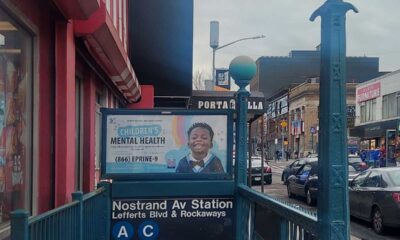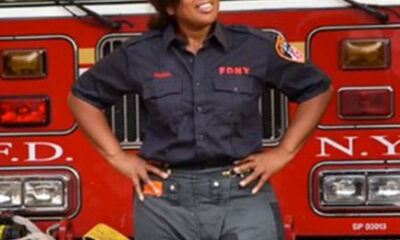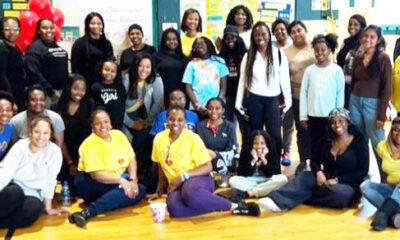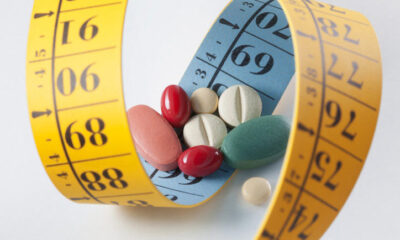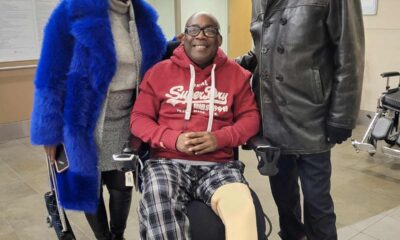Health & Wellness
Making Strides Against Breast Cancer
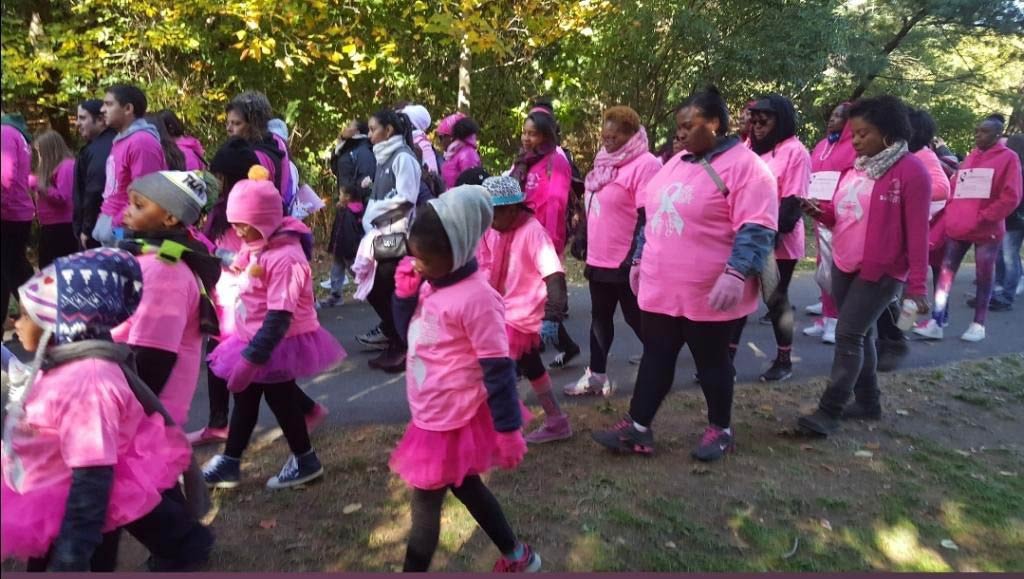
By Nayaba Arinde
Editor-at-Large
“Cancer is mean, please get screened. Know your status,” said Iquan Johnson, whose wife Adrienne Ewanza Vails-Johnson died from cancer in 2021. He spoke to Our Time Press from the Mammogram ScanVan, at Restoration Plaza, in Bedford Stuyvesant, Brooklyn, as Breast Cancer Month got underway. “Prevention beats cure,” he said, as stats predict that 1 in 8 women will face cancer in America.
There are 4 million breast cancer survivors in the U.S.
Positivity. Proactive action. A focused mindset. Tools are needed to fight any illness, but October is the pink-tinted fund-raising, breast cancer awareness-spreading, time of the year.
Research dollars are needed, health care fundraisers tell the public.
There were a reported 100,000 walkers across the nation on Sunday, October 15th, 2023; 50,000 of them were scheduled to be at the American Cancer Society’s 30th annual Making Strides Against Breast Cancer walk in Central Park.
Full disclosure; to highlight Black awareness, the Making Strides against Breast Cancer is a walk this reporter, a 16-year breast cancer survivor, has participated in many times.
For survivorship, a strong support network is key, and can include; family, friends, work colleagues, and medical professionals, from – popular alternative medicine practitioners, to the mainstream Western-trained facilitators.
While it is a hyper-focused fund-raising season; there is, of course, a whole other debate about what percentage of money raised goes to actual research; versus how much is used for “administration costs” and salaries.
Mammograms probably make no one’s My Favorite Things-to-Do List! But personal advocacy is an essential part of self-love. Reportedly, 168,000 people in the United States are living with metastatic stage 4 breast cancer. Early detection and diagnosis are key, according to the wide range of informed voices on the subject.
Project Renewal parks its clinic-on-wheels in various neighborhoods, including Bed Stuy. Friendly staff stand with clipboards outside places like Restoration Plaza on Harriet Ross Tubman Boulevard also known as Fulton Street, at Marcy Avenue.
Citywide they gently try to persuade passersby to step onboard the bus, in order to receive a cost-free, insurance-not-required mammogram. Project Renewal states that they service thousands of people a year.
Yet, the ScanVan bus is in danger of being scrapped.
In conjunction with One Brooklyn Health, Alicia Edwards, Care Coordinator from Interfaith Hospital told Our Time Press, “We need this van, but they are talking about ending the service to the community because they need more people to participate in the community program.”
Iquan Johnson drives the Care Van and also tells the public about the opportunity to receive an on-the-spot, free mammogram. A single father of three small children, Mr. Johnson told Our Time Press, that he was inspired to do the work he does after his wife died unexpectedly from stage 4 lung cancer 3 years ago.
With Adrienne Ewanza Vails-Johnson, Mr. Iquan Johnson had 3 children 10, 9, and a 5-year-old. His wife was only 47 when she passed, and had not told him how severe her illness was. “I guess she didn’t want me to worry. She was my spiritual warrior, and she was physically strong.”
During the frightening initial months of the COVID crisis, Mr. Johnson said his wife was diagnosed with worsening cancer. From flatlining twice to having a tumor blocking her airways to enduring heavy chemotherapy, then suffering a collapsed lung, she fought to come out of a coma. “But, as she went through chemo and dialysis, they said the cancer spread throughout her brain and body. It just hurts watching your wife deteriorating before your eyes,” Mr. Johnson said.
Admitted to Maimonides in July 2020, Ms. Vails-Johnson died on September April 6, 2021.
“Taking one day at a time,” Mr. Johnson spoke on immediately becoming homeless after her passing “because I wasn’t on my wife’s lease. We were married spiritually, but not on paper. I didn’t have time to grieve, because I refused to give my children up, and we had to go into the shelter. But, before she passed she poured her soul into me and made me strong. I weathered the storm. We have a home now. My kids are doing well, and their school grades are good. Me doing this work helping others, helped me.”
Stating that his faith is what guides him, Mr. Johnson acknowledged that in the Black community, “After cases like the Tuskegee Experiment and bias – we are nervous. We are afraid to go to the hospital. There is a lack of trust. But we have to make sure that our health is our priority.
“I see the van as a necessity, making the community aware of the importance of being screened. But, the program is scheduled to close on December 31, 2023.”
Project Renewal proudly proclaims that “Every year, the ScanVan serves more than 4,600 women at 240 sites citywide…Hundreds of early cancers have been detected at the ScanVan —and hundreds of lives have been saved.”
“We need a huge grant. It’s all about dollars and cents,” Rory Dolan from Project Renewal’s ScanVan Program told Our Time Press. “It’s a situation that we all want to prevent. We get some money from the federal and state governments, but we lost one of the donors.”
Mr. Dolan advised folk to, “Call your representatives. Let’s raise the money to keep our mammogram ScanVan going.”
Project Renewal ScanVan, the nation’s first mobile mammography clinic, states that “60 percent of uninsured women who don’t have a regular doctor, forgo their annual mammogram because of high costs and lack of access to care.”
Mr. Johnson remains optimistic, “If we can get a sponsor to pick up the program, I will drive the ScanVan anywhere it is needed, and it is needed.”
Breast Cancer Prevention Partners have stated that a change in the use of toxins like the hormone-disrupting chemical diisononyl phthalate (DINP), in beauty and home cleaning products, can impact the probability of getting breast cancer.
“African American women face both disproportionate exposure to breast carcinogens and the highest risk of serious health impacts from the disease,” BCPP states on its home page. “1 in 8 women will face a breast cancer diagnosis in her lifetime… And yet 90% of breast cancers have no link to genetics alone. That’s why we work to eliminate the other risk factors—to save lives and prevent breast cancer before it starts.”
SIGNS TO LOOK FOR:
Changes in the size or the shape of the breast.
• Pain in any area of the breast
• Discharge other than breast milk (including blood)
• A new lump in underarm or breast
The New York State Department of Health states that women under age 40 are at high risk for breast cancer. They have the Cancer Services Program where people can call 1-866-442-CANCER (2262) to find out where they can get local breast cancer screening.
“It’s important to be screened for breast cancer,” says the state health department. “Breast cancer is the most common cancer among women in New York. It is also the second leading cause of cancer-related death in New York women.
“Regular screenings can find breast cancer at an earlier stage when the disease is more easily treated.”
RESOURCES
There will be a Community Health Fair at Antioch Baptist Church (826 Greene Avenue, Bed Stuy. 10-2pm, Saturday Oct 21, 2023. 347 614 8164 (www.antiochbaptistbrookklyn.com),
https://www.projectrenewal.org/health-scanvan
For more information or to schedule a ScanVan appointment call 646 415 7932
The NYS Cancer Services Program offers free breast cancer screening and diagnostic services for uninsured, eligible New Yorkers.
https://www.ny.gov/get-screened-no-excuses/new-york-state-breast-cancer-services


